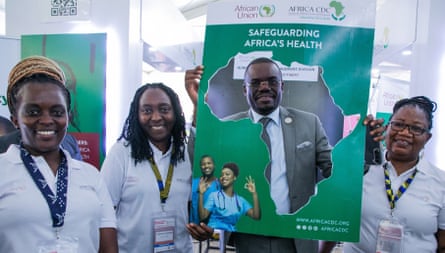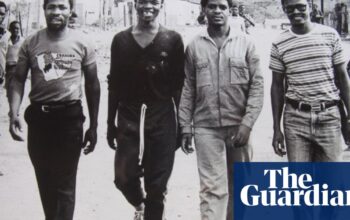The top health organization in Africa is using the inaugural health day at Cop on December 3rd to advocate for greater funding to combat the effects of the climate crisis on the continent’s health and establish stronger systems to prepare for future pandemics.
The Africa Centres for Disease Control and Prevention (Africa CDC) began the second stage of its Saving Lives and Livelihoods initiative this week, which aims to raise $1.5 billion over a period of three years. However, Dr Jean Kaseya, the director general, stated that due to numerous disease outbreaks and the increasing impact of non-communicable diseases, as well as the ongoing recovery from Covid, additional financial assistance is crucial.
Kaseya stated that in Africa, they are making efforts to secure funding to address these problems, but they require additional funds from international organizations like the World Bank’s pandemic fund, Pepfar, and the Global Fund.
“In the period of January to November 2023, 158 disease outbreaks occurred in Africa. These occurred in the aftermath of the Covid pandemic, which severely damaged economies. As a result, countries are now faced with the task of addressing these outbreaks.”
He stated that the issue of the climate crisis is one of the main causes of the problem, which has also led to an increase in cholera cases. He also mentioned that currently, there are 18 countries affected by cholera, resulting in 4,000 deaths, and there is also a presence of dengue in West Africa that is causing fatalities.
He stated that Africa requires a strong healthcare system in order to effectively handle any potential outbreaks. He expressed concern that any missed outbreak could potentially turn into a pandemic, which is a major worry. He emphasized the need to prevent Africa from being the source of the next pandemic due to the impact of climate change, and stressed the importance of securing additional funding for this cause.
According to Kaseya, the Ebola outbreak from 2013-2016 and the current Covid pandemic have brought attention to Africa’s lack of healthcare resources. This has emphasized the importance of developing African-based production of vaccines and medication. During the Conference on Public Health in Africa in Lusaka, Zambia, Kaseya compared this movement to “Africa’s second liberation”.
During our experience with Covid, we realized that Africa had been neglected. It became evident that we were not self-sufficient. Africa had to plead with the rest of the world for basic supplies such as masks and gloves.
Africa currently relies on external suppliers for 99% of its vaccines, but the Africa CDC aims to have 60% of vaccines produced on the continent by 2040.
According to Kaseya, promoting local manufacturing will boost our economy, generate employment, foster innovation, and promote peace and security. This is because when individuals have jobs and access to various goods, they are less likely to engage in conflict.

The Africa CDC is aiding in the effort to educate and prepare a large number of new healthcare professionals to address shortages in specialized skills. According to Kaseya, only a small percentage of African nations have the capacity to effectively handle a major disease outbreak due to a lack of trained healthcare workers. The continent currently needs 6,000 field epidemiologists, but only has 1,900 available. Additionally, there is a need for 25,000 frontline epidemiologists, yet only 5,000 are currently available.
Governments are urged to support Africa CDC’s goal of establishing a strong healthcare system throughout the continent. However, there is a significant difference in budget allocations among countries, and the impact of Covid and climate change has negatively affected economies.
Kaseya stated that her message to Cop28 is to make sure that Africa’s voice is heard. She wants to convey that they have evidence to show how climate change is directly and indirectly impacting their continent. She also mentioned that Africa’s GDP is decreasing by 5 to 15% every year due to climate change, resulting in a lack of funds for important areas such as healthcare.
Source: theguardian.com


